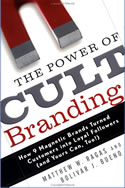 Yesterday’s announcement that CBS is suing Howard Stern and Sirius reminded me of a Jacobs Media Summit presentation from 2004. Our guest speaker, Matt Ragas, wrote "The Power of Cult Branding" – the story of how great companies like Starbucks and Harley-Davidson have built their legendary brands.
Yesterday’s announcement that CBS is suing Howard Stern and Sirius reminded me of a Jacobs Media Summit presentation from 2004. Our guest speaker, Matt Ragas, wrote "The Power of Cult Branding" – the story of how great companies like Starbucks and Harley-Davidson have built their legendary brands.
I agreed with all of Matt’s "7 Rules for Building a Cult Brand" until I got to #7:
Cult Brands promote personal freedom and draw power from their enemies.
I "got" the personal freedom part, but wondered about how having an enemy has helped Cult Brands like Oprah Winfrey or Fender guitars.
 But when you think about the Cult Brand that is Howard Stern, this seventh rule has been the key to his success. Howard has flourished when attacked – whether it’s right-wing religious groups, the FCC, incensed advertisers – and now, his former employer.
But when you think about the Cult Brand that is Howard Stern, this seventh rule has been the key to his success. Howard has flourished when attacked – whether it’s right-wing religious groups, the FCC, incensed advertisers – and now, his former employer.
For the last month, Stern has been way off the radar screen. After that big build-up in December and his Sirius debut in January, he has struggled to regain the spotlight.
Until yesterday.
As my clients know, I didn’t do exceptionally well on the LSATs, and have never claimed to know much about the legal profession. So whether CBS has a great case or not is beyond my expertise – and my business.
But as a marketer of brands, I can clearly see the net effects of this suit on media visibility and top-of-mind awareness. After finally hearing the end of Howard’s Sirius pitching throughout 2005, he’s back on the front pages, stirring it up once again.
- Media And Technology In 2025: Believe It Or Not! - April 18, 2025
- In Radio, You Just Never Know - April 17, 2025
- The Secret To Making A Great Podcast (And Great Radio) - April 16, 2025




Agreed! Stirring it up and getting on the front page is priceless buzz. However, typically the stuff that gets on the front page is compelling because we’re dealing with risky adventures that may hit a company in the pocket book, put jobs at risk, or worse, put a station’s license in jeopardy. “Stir it up” is often the war cry of many programmers.
But, we on-air folks hear from the same programmers- with the same fanaticism, “You better be careful.” “Can’t do that, the lawyers will have a fit.” “You guys are really pushin’ the envelope.” (All uttered for CYA purposes, I suppose.)
So which is it-stir it up, or play it safe?
Clearly, one must take risks to reap rewards. But in the end, if the walls come crashing down, who pays?